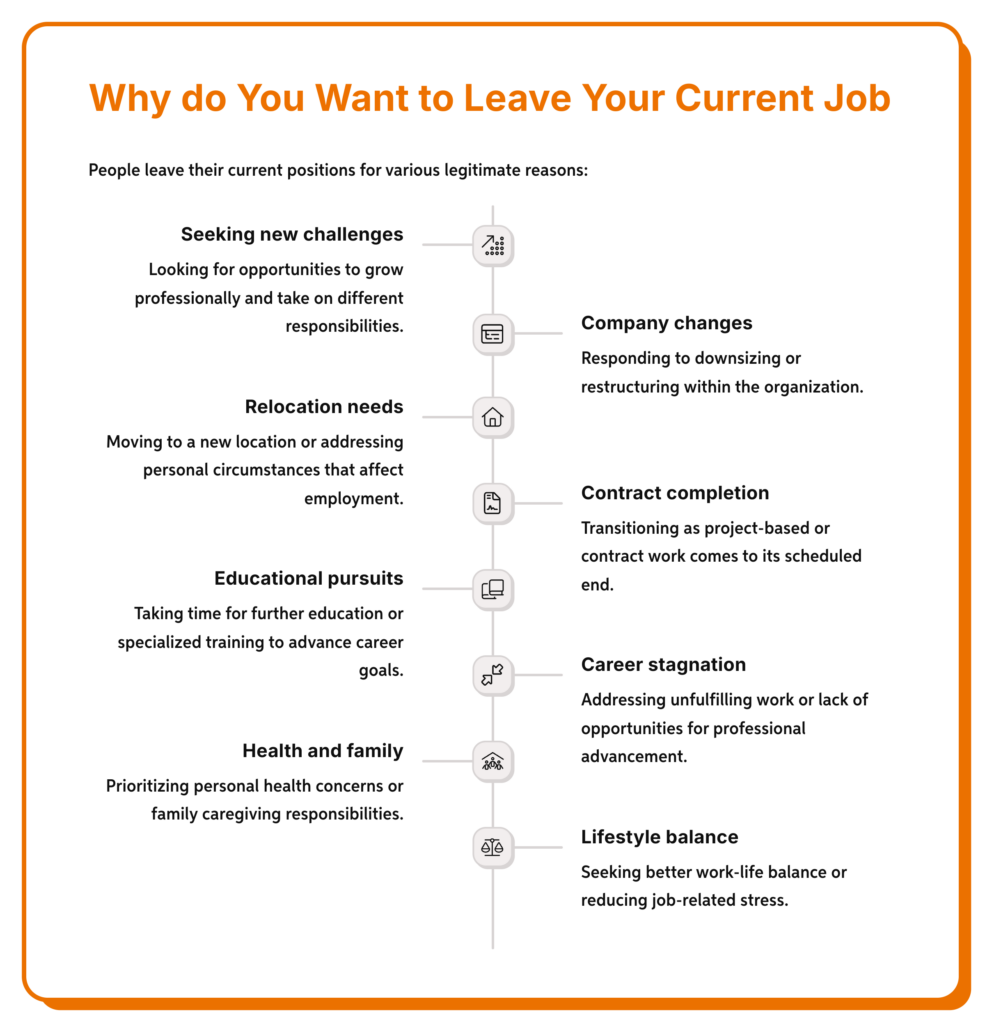

Quick Summary

When preparing for an interview, one of the most frequently asked questions is “Why do you want to leave your current job?” Employers ask this to understand your motivations, career goals, and whether you’re the right fit for their company. Your response to “Why do you want to leave your current job?” should remain positive and professional, avoiding any negativity about your current employer. Instead, focus on your desire for career growth, new learning opportunities, or a work environment that better aligns with your long-term goals.
A well-prepared answer to “Why do you want to leave your current job?” can set you apart from other candidates. Emphasize aspects such as professional development, a broader scope of responsibilities, or a company culture that better matches your values. If compensation, work-life balance, or leadership concerns are factors, frame them in a way that highlights your aspirations rather than complaints. Employers appreciate candidates who are forward-thinking and motivated by growth rather than dissatisfaction.
By structuring your response carefully, you can confidently answer “Why do you want to leave your current job?” while making a strong impression on the recruiter. Preparing in advance ensures that your answer is concise, compelling, and demonstrates professionalism. This approach not only helps you stand out but also increases your chances of securing your next opportunity.
Before we explore how to answer “why do you want to leave your current job,” it’s important to understand why hiring managers ask this question. They want to gauge your motivations, career goals, and how you handle challenges. Your response provides insight into your work ethic and whether you’re a good fit for their team. By asking “Why do you want to leave your current job,” managers are also assessing your level of self-awareness and your ability to communicate effectively. Understanding their perspective can help you prepare a thoughtful answer that highlights your aspirations for growth and development. This preparation can make a positive impression during your interview.
There are several reasons why a recruiter might ask why you want to leave your current job:

Now that we’ve discussed why recruiters ask this question, let’s explore how to effectively answer “Why do you want to leave your current job.” Understanding the intention behind the question helps you prepare a thoughtful response. Focus on positive aspects, such as your desire for professional growth, new challenges, or a better fit for your skills and values. Avoid speaking negatively about your current employer, as this can reflect poorly on you. Instead, emphasize what you’re looking for in your next position and how it aligns with your career goals. By preparing a clear and positive answer, you can confidently address the question and make a strong impression during your interview.
When answering the question, “Why do you want to leave your current position?”, it’s crucial to be honest while maintaining a positive tone. Avoid criticizing your current employer. Instead, frame your reasons for leaving in a constructive manner, highlighting what you hope to achieve or gain from a new role. Focus on your career aspirations and how the new position aligns with your goals.
“I’ve enjoyed my time at my current company, but I’m ready for a new challenge and an opportunity to grow in my career. By making this change, I believe I can bring my skills and experience to a new team and make a valuable contribution to the company.”
Explain how the new job aligns with your career goals and how it will help you achieve them. Focus on the opportunities for growth, learning, and development the new position offers.
“I’m excited about this new role because it will allow me to take on more responsibility and develop my leadership skills, which I’m passionate about.”
When addressing “Why Do You Want to Leave Your Current Job?”, it’s essential to align your career goals with the goals of the company you’re interviewing with. Research the company’s mission statement, values, and culture to determine if their objectives match yours. Demonstrating this alignment will show the interviewer that you’re genuinely interested in the specific position and the company, not just any job opportunity. This approach highlights your commitment to a role that fits your career aspirations and values.
Talk about the new challenges the new job presents and how you’re excited to take them on. This shows that you’re motivated and willing to take on new responsibilities.
“I’m looking for a role that will challenge me to think creatively and come up with innovative solutions to complex problems. I believe this new position will provide that opportunity.”
It’s important to show that you’re willing to take on new challenges and step out of your comfort zone when answering “Why do you want to leave your current job”. Give an example of a time when you took on a new challenge in your current or previous job and how you succeeded. This will demonstrate to the interviewer that you’re adaptable, resilient, and proactive.
Avoid mentioning negative reasons for leaving, such as conflicts with management, lack of advancement opportunities, or dissatisfaction with the current employer.
“I’m looking for a company that can offer more flexibility in terms of work-life balance. While I’ve enjoyed working with my current team, finding a position that allows for a better balance between my personal and professional life would lead to increased job satisfaction and productivity.”
Additionally, it’s important to avoid discussing personal issues or family commitments that may influence your decision to leave. These reasons may be understandable, but they are generally irrelevant to the employer, and discussing when answering “why do you want to leave your current job” may give the impression that you are not fully committed to your career.
When answering the question, “Why do you want to leave your current job?”, it’s important to keep your response concise and to the point. Avoid rambling or going off-topic. Stick to your key points and emphasize how the new job aligns with your career goals.
“I’m looking for a new challenge and an opportunity to continue growing in my career.”
or
“I’m seeking a company that aligns with my values and provides opportunities for professional development.”
Remember, the interviewer is likely to have a lot of questions, and you don’t want to take up too much of their time with a long-winded response. A concise, well-thought-out answer to the question “why do you want to leave your current job” will leave a positive impression and demonstrate your confidence and professionalism.

To help you prepare for your interview, here are five sample answers to the question, “Why do you want to leave your current job?” These examples will give you a better idea of how to frame your response positively and effectively. Focus on aspects such as your desire for growth, new challenges, or a better fit for your skills. When answering “why do you want to leave your current job,” avoid negative remarks about your current employer and instead emphasize what you hope to achieve in your next position. Practicing these sample answers can boost your confidence and ensure you make a strong impression during your interview, increasing your chances of success.
Each answer highlights a different reason for leaving your job and demonstrates how to frame your response for “why do you want to leave your current job” in a positive light. Reviewing reason for leaving your job examples can help you structure your answer effectively and ensure that you present your decision professionally. Additionally, employers consider employee turnover when assessing candidates, so providing a well-structured response can help demonstrate your long-term commitment.
“I am looking for new challenges and opportunities for growth that I haven’t found in my current position. While I’ve gained valuable experience at my current job, I feel I’ve reached the limits of what I can achieve here. I’m excited about the prospect of taking on new responsibilities and learning new skills at this company.”
“When asked, ‘Why Do You Want to Leave Your Current Job?’, you might say, ‘I’m looking for a company that is a better cultural fit for me. While I’ve enjoyed my time at my current job, I feel that the company culture doesn’t align with my values and work style. I believe that this company’s culture is a better match for me, and I’m excited about the possibility of joining a team that shares my values. A strong cultural fit can also reduce employee turnover, ensuring a more engaged and motivated workforce.’”
“I’m looking for a company that offers more opportunities for career progression. While I’ve enjoyed my time at my current job, I feel that my career has plateaued here. My reason for leaving current job is the lack of professional growth and advancement opportunities. I’m looking for a company that values professional development and provides clear paths for advancement. From my research, it seems that this company offers the kind of opportunities for growth and learning that I’m looking for.”
“I’m looking for a company that aligns more closely with my long-term career goals. While I appreciate the experience and skills I’ve gained at my current job, I don’t see a clear path for advancement or opportunities to pursue my passions in the future. I want to work for a company where I can see a future for myself and feel like I’m making progress towards my ultimate goals.”
“When addressing “Why Do You Want to Leave Your Current Job?”, you might respond with: “I’m seeking a work environment that better suits my work style and preferences. Although I’ve enjoyed working with my current team, the pace and structure here don’t align with my strengths as well as they could. I’m looking for a company that values innovation, creativity, and flexibility. From what I’ve learned about this company, it seems like the ideal place where I can thrive and make a significant contribution.”
The question “Why do you want to leave your current job?” is common in job interviews, so it’s essential to be prepared to answer it confidently and professionally. When crafting your response, remember to be honest but diplomatic. Focus on your career goals and the positive reasons for seeking new opportunities. Avoid negative comments about your current employer, as this can leave a poor impression. By practicing your answer and keeping these tips in mind, you’ll be ready to effectively address “why do you want to leave your current job” and impress your interviewer. This preparation will help you stand out and increase your chances of landing your dream job.
Additionally, when considering how to answer “why do you want to leave your current job,” it’s important to frame your response in a way that emphasizes your desire for growth. You might express a longing for new challenges, skills development, or a better cultural fit with the prospective employer. This positive spin can turn a potentially tricky question into a chance to showcase your ambitions. Remember, your answer should reflect both your personal goals and the potential benefits to the new company. By articulating clearly why you want to leave your current job, you can demonstrate your commitment to finding a role that aligns with your career path, ultimately leaving a strong impression on your interviewer.
Ace your job interviews with tailored tips for a great first impression! Explore more Interview Tips with us.
Deciding to leave a job is often a strategic move driven by the need for career growth, better opportunities, or a stronger alignment with one’s long-term goals. When answering Why do you want to leave your current job?, it’s essential to focus on positive aspects such as professional development, new challenges, or a healthier work environment. Employers appreciate candidates who are looking to enhance their skills, take on greater responsibilities, or contribute more effectively in a new role rather than dwelling on negative experiences.
A well-thought-out response to Why do you want to leave your current job? can highlight your ambition, adaptability, and vision for the future. Whether seeking better work-life balance, a more dynamic company culture, or opportunities for skill enhancement, framing your decision positively leaves a strong impression. By focusing on growth and long-term career objectives, you demonstrate your commitment to making meaningful contributions in your next role while maintaining professionalism and confidence. Reviewing a reason for leaving job best answer can help you craft a response that highlights your aspirations and aligns with your future goals.

Having a clear and concise reason for leaving a job demonstrates that you have thought carefully about your decision and are serious about your career. It also provides potential employers with insight into your professional goals and what motivates you.
When explaining your reasons for changing a job in an interview, it is important to be honest but diplomatic. Focus on your career goals and the opportunities that the new position presents. Avoid mentioning negative reasons for leaving, such as conflicts with management or dissatisfaction with the company culture.
To frame your reasons for leaving your current job in a positive light, focus on the opportunities that the new position presents. Highlight how the new job aligns with your career goals and offers growth and development opportunities. Additionally, avoid speaking negatively about your current employer or work environment. This approach will help you effectively answer the question, “Why Do You Want to Leave Your Current Job?
I left my last position to spend more time with my family. However, my circumstances have changed, and I am now fully prepared to return to full-time employment. I am seeking a position with a stable company that offers growth opportunities and a clear path for career advancement.
Some signs that it may be time to leave your current job include feeling unchallenged or unfulfilled, experiencing a toxic work culture, or feeling undervalued or underpaid. If you find yourself consistently unhappy or unmotivated at work, it may be time to consider a change.

Authored by, Amay Mathur | Senior Editor




Amay Mathur is a business news reporter at Chegg.com. He previously worked for PCMag, Business Insider, The Messenger, and ZDNET as a reporter and copyeditor. His areas of coverage encompass tech, business, strategy, finance, and even space. He is a Columbia University graduate.
Editor's Recommendations
Chegg India does not ask for money to offer any opportunity with the company. We request you to be vigilant before sharing your personal and financial information with any third party. Beware of fraudulent activities claiming affiliation with our company and promising monetary rewards or benefits. Chegg India shall not be responsible for any losses resulting from such activities.
Chegg India does not ask for money to offer any opportunity with the company. We request you to be vigilant before sharing your personal and financial information with any third party. Beware of fraudulent activities claiming affiliation with our company and promising monetary rewards or benefits. Chegg India shall not be responsible for any losses resulting from such activities.